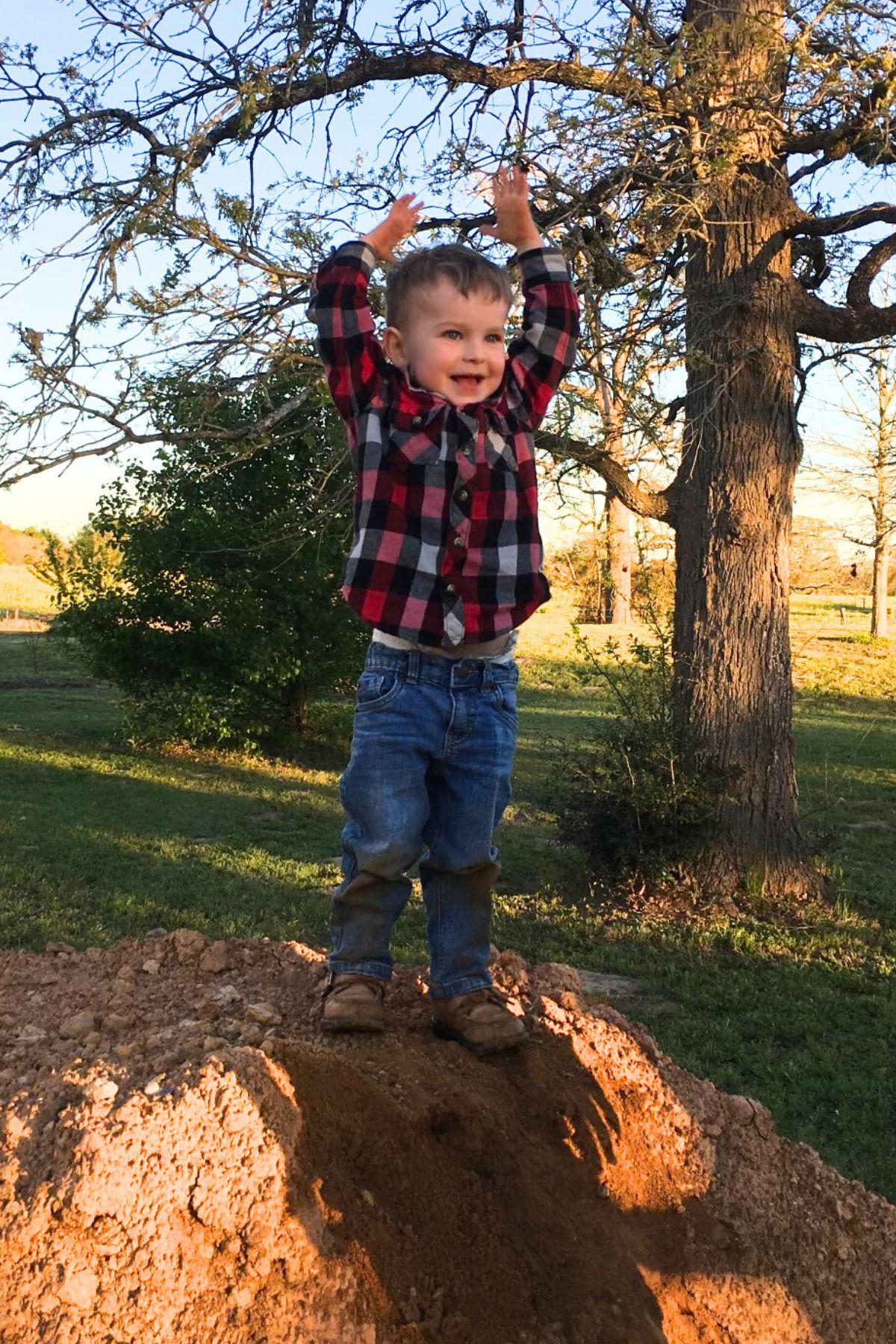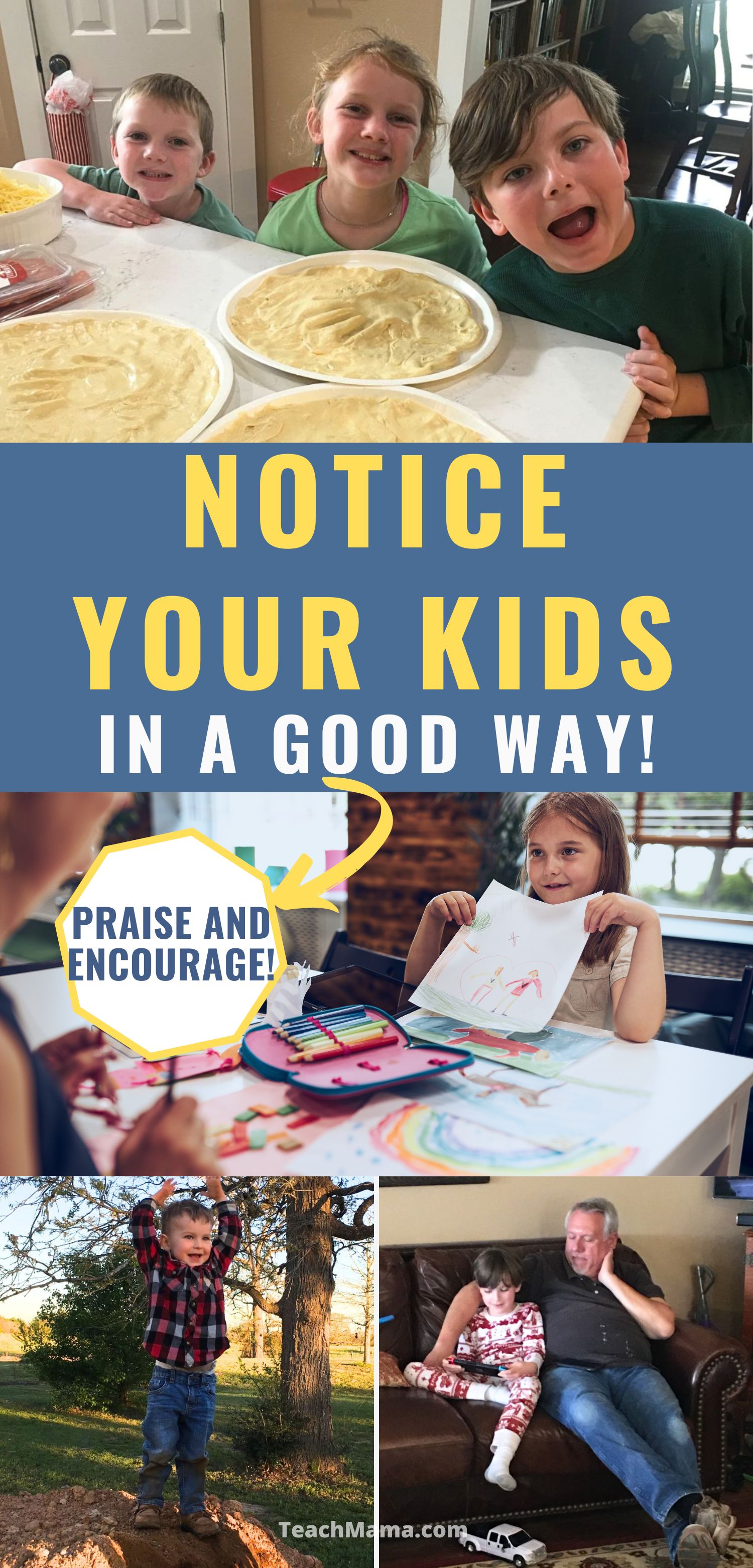How to calm both your child’s “Mommy, Mommy, MOMMY” attention-seeking behaviors and your frazzled Mom nerves by actually noticing and interacting with your kids. The pay-off lasts long beyond that one moment.

A little boy, about four, stood at the top of the slide in the McDonald’s playground shouting “Watch ME, Mommy! Watch ME, Daddy!” over and over to his parents sitting with a younger child about fifteen feet away. They said ,”Uh huh”, but never looked over. My heart broke for him.
When their meals arrived he climbed off the slide, came over, pinched the younger child… and finally got his parents’ attention! With some small changes you can master the “art” of positive attention so it doesn’t have to be that way. Okay, not all the time anyway.
There’s an Art to “Noticing” Your Kids
What would the Mona Lisa have looked like if Picasso or Van Gogh had painted her? It would still show masterful brushwork, vibrant colors and evoke emotions for the viewers. It would still be “art” but can you image how different those three paintings would be?
Each child is a unique “work of art” and how you notice and appreciate that will differ from child to child. You may notice all the hard work and success one child has in sports while another may be working to be successful in an entirely different way. Each needs to be noticed in a way that authentically speaks to them.

Step Off the Path of Least Resistance
No matter where we are on the parenting spectrum, our kids love us and they want (and need) our positive attention. They need it for a lot of reasons. What we know about ourselves comes largely from other people and the first, most important ones are our parents.
Yet in my counseling practice I see over and over again, parents who don’t seem to realize they need to put real effort into parenting their children. Beyond feeding, clothing and housing them. Our words teach them their strengths and abilities.
We notice their gifts and show them how they can contribute positively by sharing those gifts with other people. Being active parents requires us to be intentional or proactive and not taking the path of least resistance so our kids learn these very important lessons. Okay! How do we do that?
Proactive versus Reactive Responses
Every time your child comes to you for attention and notice is a golden moment. I know you’ve had a long day at work and all you want is five minutes of peace and quiet. This won’t take half a minute. It will certainly be less stressful and take less time to be positively proactive (causing something to happen) than it will to be negatively reactive to the problems later.
Let’s say your little one is showing you an artistic masterpiece they’ve just colored. Instead of a bland, “That’s nice” (not enough information) or even “I like that. It’s so pretty” (not a bad start, but still conditional on you liking it) try “Wow, tell me about this picture.” (their interpretation matters)
“Look at all the colors you used!” (their decisions are noticed positively) “It’s fantastic how you used your imagination!” (building confidence in their own abilities) Can you see the difference?

Watch your child for things you can comment proactively on. When our daughter was about eight I commented on how a compliment she had given the checker at the grocery store had been so sweet. For the next year or so everywhere we went she was giving compliments to total strangers! It was amazing to see people’s faces light up at her kind words.
Make sure the words you say are true though! Kids can spot empty words and fakery a mile off. The quickest way to destroy their trust in you is to try to fake it … otherwise known as lying.
Put the emphasis on them. “You picked up your toys without be asked! Now we’ll have more time for stories tonight! (positive consequences). “You were so kind to help your little brother find his shoes.” (reinforcing good behavior without being heavy handed)
Practical Tips
- Noticing Behaviors: The goal with noticing is to state an observation rather than making a judgmental or conditional comment. “Your clothes are all folded!” “You checked your little sister’s math problems.”
- Start your sentence with the child’s name or the pronoun ‘you’. Look at you!, or Chris, I noticed how you…
- Describe what you see. You found her blanket and gave it to her. That was so helpful!
- End your description with a ‘tag’. Tags describe attributes of your child or values you admire, like that took determination; you sure are organized; that was helpful; that was thoughtful.
If you practice these four steps regularly with your kiddos they won’t be starved for your attention because they will have a steady diet of of high quality meaningful attention from the people who mean the most to them. You! And perhaps you’ll even get those occasional five minutes of peace and quiet!
Related Posts for Intentional Parenting
- How to Get Your Kids to Open Up
- How to Write a GREAT Thank You Note
- The Importance of Unstructured Play for Kids
- Handling Sadness, Tragedy and Grief As a Family
- Make the End of School Special with a Family Dinner to Remember
- Noticing Your Kids … In a Good Way
- Dealing With Childhood Fears – A Parent’s Guide
- Is My Child Gifted?
- 9 Things All Kids Must Hear Their Parents Say
PIN THIS FOR LATER


Interestingly, I just had a conversation with my husband about our approach to disciplining our almost 3 year old. He is a lot more consistent into enforcing rules, but it led to a clear preference of me over him, and he is hurt over it. I think I should remind him of focusing on positive. I read before that "good job" is not a good idea. I wrote a post about it some time ago – http://learningwithmouse.blogspot.com/2009/08/encouragement-vs-praise.html
My oldest is three and this age seems to be more challenging than when she was two. This is a great idea in telling her what about the good things she's done. I feel like I say "Good Job" all of the time. This looks hard, but worth it in the end.
thank you for this. i was so gung ho on reading all the right discipline stuff before baby#1 could even crawl, and sooo much of it is forgotten, esp in the moment! I need to remember this more…
Thank you! We have had a really rough weekend. I needed to be reminded.
Thank you so much for this post – it's a great reminder of all the things I seem to be forgetting when dealing with a small child. Thank you very, very much!
I wanted to let you know that you have revolutionized not just my relationship with my 2 year old, but helped me be a better person as well. After reading your quick tricks, I checked out Becky Bailey's Easy to Love, Difficult to Discipline. I read it cover to cover and was amazed to learn how passive I was in my communication with everyone around me. My relationships with my daughter, my mother and my husband have all improved. Thanks for the great book recommendation.